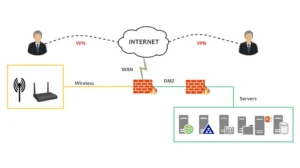OpenVPN is a popular open-source VPN protocol that enhances online security and anonymity. It establishes a secure and encrypted tunnel between your device and a remote VPN server and routes your internet traffic through this tunnel.
Due to such a protocol, OpenVPN prevents third parties like hackers or government agencies from intercepting. So, does OpenVPN hide your IP address? The short answer is Yes, OpenVPN can hide your IP address by routing your internet traffic through a secure VPN server, masking your real IP. But how does it do that, and to what extent?

What Does OpenVPN Hide?
OpenVPN applies powerful encryption techniques to your traffic. As a result, it hides your personal data, browsing history, download history, search history, and other online activities from ISPs, scammers, and governments.
Does OpenVPN Hide Your IP Address?
OpenVPN hides your IP address. But you must know how it accomplishes this feat. When you use OpenVPN, your public-facing IP address gets concealed from websites and online services and gets replaced with the IP address of the OpenVPN server you are connected to.
Here’s how OpenVPN helps hide your IP address.
Encryption: OpenVPN encrypts your internet traffic, including your IP address. Hence, it becomes difficult for interceptors to decipher the data underneath.
Server Location: As long as you stay connected to an OpenVPN server, your original IP address gets replaced with the VPN server IP. That means the websites and services will see the server IP address instead of yours.
Anonymity: Since OpenVPN routes your traffic through a server in a different geographical location, your actual location stays hidden. Also, your ISP or government organizations cannot see your browsing activities, which adds a level of anonymity.
What does OpenVPN not hide?
Although OpenVPN can hide your IP address, it cannot make you completely anonymous or immune to tracking. Here’s a list of things OpenVPN cannot hide.
Already Existing Cookies: If you have allowed certain websites to use cookies, OpenVPN won’t stop those. So, clear them to maintain better online hygiene.
Login Credentials: Even when using OpenVPN, your identity may still be accessible to websites you logged into using credentials or personal information.
Your Absolute Identity: You have to keep in mind that no tool can make you 100% anonymous, and OpenVPN is no exception. If a service promises absolute anonymity, it’s probably a scam.
Besides, some websites may have VPN blockers, making it harder to mask your IP address and other information.
Frequently Asked Questions
Does OpenVPN hide my location?
Yes, OpenVPN encrypts your traffic while hiding your location along with browsing history, search history, and downloads.
Does OpenVPN hide traffic from ISPs?
OpenVPN applies encryption over your internet traffic, which, in turn, hides your browsing history. But your ISP may still be aware that you are connected to a VPN and also the duration of that connection.
Is OpenVPN Traceable?
OpenVPN can hide your IP address and browsing activities from third parties. However, since your IP address is not the only way you can be traceable, your location may still get exposed via GPS-based services.
Conclusion
OpenVPN is a powerful tool for hiding your IP address and enhancing online privacy. Since it has strong encryption standards, bad actors cannot get access to your online activities. Yet, it is not without limitations. Your data may still be at risk whenever you accept cookies on a website or log into your account using personal information. We hope you’ll keep that in mind. Thanks for reading!



